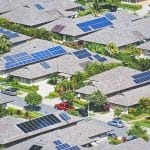Are you considering a backup electricity supply for your home?
Two common options are home backup generators and home batteries. They are both different, and the correct choice should be based on your budget, the amount of power you need, and several other important factors that we’ll cover..
Use this guide to learn which one is right for you.
Why Do I Need An Alternative Power Source?
Did you know 500 thousand people are affected by power outages every day in the US?
Shockingly, that number is going up, and weather-related power outages have doubled since 2003. Preparing for a power outage isn’t just for convenience either. Kholer reports that power outages cost American households $150 billion every year.
If you do not have a home backup generator or battery, costs can skyrocket quickly. Burst pipes, frozen pipes, food loss, alternative shelter, and more all add up quickly. Backup power systems have a one-time equipment and installation fee but can drastically reduce the effects of a power outage on your home and your budget.
What Is A Home Backup Generator?
A home generator is a standalone unit placed outside of your house. It is connected to the grid and powered by your natural gas line. When a power outage occurs, it starts automatically and turns your electricity back on within seconds.
What Is A Home Battery?
A home battery is a power storage unit that kicks on when there’s an outage. It can either be charged through the normal electric grid or with wind or solar power. Home battery systems can provide power to your home for a finite amount of time during an outage before they need to be recharged.
Which One Has More Power?
The U.S. Energy Information Administration reported in 2017 that the average American home uses about 30 kilowatt hours (kWh) of power every day. This information can help you decide which energy source is right for you.
Home backup generators come with different capabilities.
Typically a generator that outputs 10 kWh will cover the essentials in your home during an outage of things like the sump pump, fridge, furnace, and some lights. If you choose one with at least 20 kWh for partial home power, you’ll also have more necessities like the garage door, light in multiple rooms and bathrooms, outlets to charge other electronics, and phone systems.
If you want your entire house powered during an outage, you will need a generator with around 30 kWh or more.
Home batteries also come with different capabilities, but they normally only output 1 to 3 kWh before they need to be recharged. That means one on its own cannot power even the basics of your home in an outage (where at least 10 kWh is ideal).
Therefore, homeowners often need to invest in an entire battery bank to match the power of a generator.
How Long Will Each One Last During An Outage?
A home backup generator can last indefinitely in a power outage because it is powered by the natural gas grid.
Battery banks, on the other hand, have a defined time limit. If your battery bank outputs 20 kWh total before it needs to be recharged, it will power the basics of your home for two days.
To determine how long your battery bank will last while providing your home with full power before it needs to be recharged, divide the number of kWh it produces by 30 to get a rough estimate.
What Is The Cost Of Each Option?
Home Advisor reports that the average cost for a backup home generator in the US is about $3,600 including installation costs. The typical range is between $1,000 and $4,000 ,with the low-end being $400 and the high-end up to $9,500.
Tesla provides Powerwall home batteries. One battery plus supporting hardware costs $6,200, not including the installation fee. This battery provides 13.5 kWh before it needs to be recharged.
Availability And Support For A Generator Vs. Battery System?
Generators are much more common than battery systems. Because of this, getting repairs or replacement parts for a home backup generator is easier than fixing and maintaining a home battery.
I Want To Go Off The Grid, Which One Is Right For Me?
If you want to completely disconnect from the grid, a battery bank is your best option. Battery banks can be charged by solar power and store the energy for later output. This means you can rely solely on your own system for electricity.
Backup home generators are usually fueled by the natural gas grid and require a connection to that underground system.
For complete autonomy, choose a home battery.
The Pros And Cons Of A Generator
Generators are cheaper to install and maintain than a battery bank, can provide unlimited power during an outage, and are strong enough to keep your entire home connected to electricity.
However, you cannot be completely autonomous with a generator because it’s connected to and fueled by natural gas.
The biggest cons are that they can be very loud when they are running, and they need regular maintenance to run properly.
The Pros And Cons Of A Battery System
Battery systems can be connected to solar power and store energy so that you can completely disconnect from the grid, and they are much more environmentally friendly than a generator.
However, battery systems are expensive to install and are less reliable. They cannot power your entire home indefinitely during a long outage.
Backup Home Generator Vs. Home Batteries, Which One Is Best For You?
The choice between a backup home generator and a battery system depends on many different factors. If you are on a budget or need reliable power during long outages, a generator is the best option.
If you want to be environmentally friendly, get off the grid completely, and have the means to invest in multiple batteries, then choosing a battery bank instead of a generator may be right for you.





